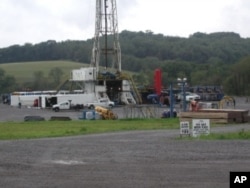A new study finds no evidence that the controversial practice to extract natural gas known as hydraulic fracturing is contaminating ground water.
The report, "Separating Fact from Fiction in Shale Gas Development," published by the University of Texas Energy Institute, attempts to allay fears that fracking poses a threat to public health and the environment.
According to Charles Groat, associate director of the institute, fracking, which injects water and chemicals into a well at high pressure to shatter the gas-bearing rock deep underground, is not to blame for polluted wells.
“However, that doesn’t mean that there aren’t other parts of the process of shale gas development that could get things you don’t want in shallow ground water or surface water,” Groat says.
The rush to develop new domestic sources of energy in the United States has led to a surge in drilling across the country in more than 30 states.
The northeastern state of Pennsylvania is issuing 2,500 permits a year to drill the Marcellus Shale, estimated to be the largest underground reservoir of natural gas in the United States.
While the stepped-up gas extraction promises to boost employment and stimulate the economy, activists who oppose the practice for environmental and health concerns, are working to ban it.
The oil and gas industry insists that fracking is both efficient and safe.
The analysis of major gas drilling operations in Pennsylvania, Texas and Louisiana finds that many reports of groundwater problems can be traced to surface chemical spills, leaky open air ponds or mishandling of wastewater and not fracking.
University of Texas environmental engineer Danny Reible believes natural sources of gas leaks must also be considered.
“There are certainly examples of natural gas wells that have casing leaks and have led to natural gas moving into drinking water wells," Reible says. "There are certainly examples of natural sources of gas both in the deep or subsurface as well as in the near subsurface that have also contaminated water supplies.”
According to the data, most media reports about fracking have cast it in a negative light and contain little scientific research.
Groat says as drilling moves closer to where people live, science must play a greater role in evaluating the long-term, cumulative effects and risks associated with the process.
“Because if there is a phenomenon, what’s the cause and I think we really feel hobbled by the lack of baseline information. How much gas was there before? How much was developed in prior times? Remember a lot of these areas, particularly the Marcellus, have really old shallow gas wells that have been abandoned for a long time. What’s their situation?”
The report finds many problems associated with hydraulic fracturing are related to processes common to all gas and drilling operations, such as drill casing failures.
The study concludes that there is no need for new regulations on gas development. It emphasizes, however, that states must aggressively enforce regulations already on the books to protect the environment, and that industry compliance will be necessary if fracking is to gain public acceptance.

















